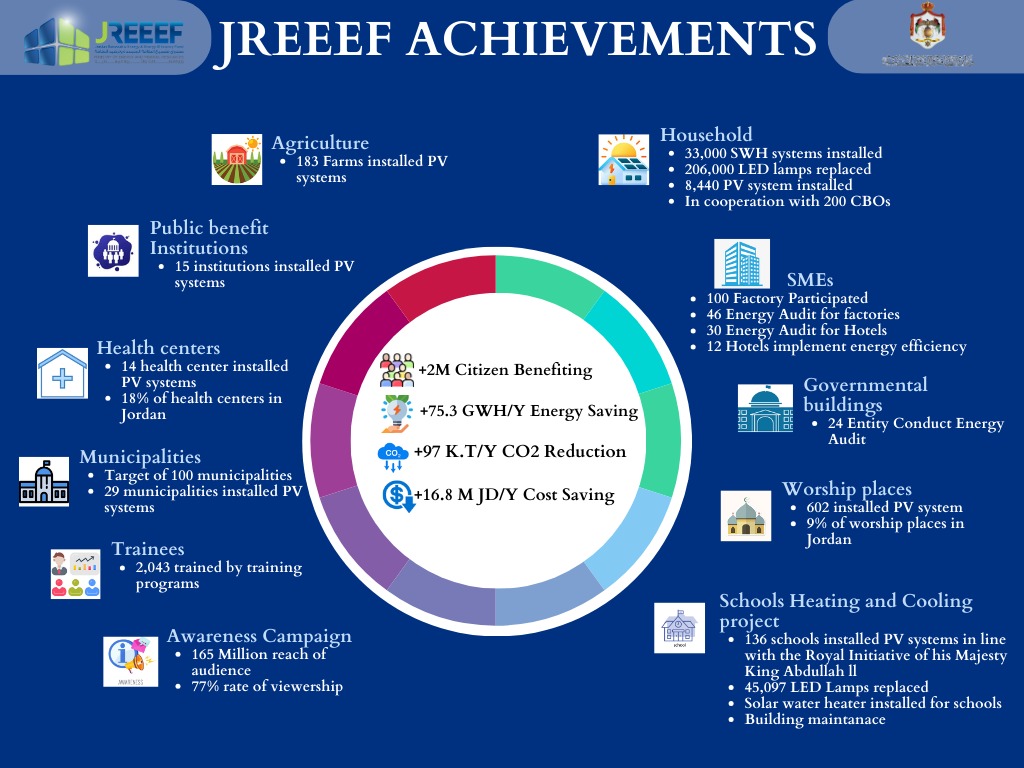
The Renewable Energy Fund projects and initiatives serve 2 million citizens and various economic sectors
- 75.3 gigawatt-hours of energy savings.
- More than 16.8 million dinars in cost savings.
- Reducing more than 97 kilotons of carbon dioxide.
February 22, 2024 - The Renewable Energy Promotion Fund (JREEEF) at the Ministry of Energy and Mineral Resources (MEMR) has worked since 2015 to implement many studies and design financing windows for programs and projects with the aim of exploiting renewable energy and rationalizing energy in most sectors operating in the Kingdom.
The fund’s work is based on a strategic plan that emerges from the bylaw of the Fund for Promoting Renewable Energy and Energy Conservation for the year 2015, and on the strategic plan of the Ministry of Energy and Mineral Resources aimed at increasing the contribution of renewable energy sources by 31% to electricity generation in the Kingdom, rationalizing energy consumption and improving its efficiency in all sectors by 9%, and reducing carbon dioxide emissions by 31% by the year 2030, in addition to expanding the spread of solar water heaters at the national level.
In line with the vision of economic modernization, the Fund’s plan aimed to provide support to sectors that have a direct impact on the national economy and citizens alike through programs and projects implemented in partnership with national institutions working in the sector, international donor institutions and programs, international organizations and the Jordanian private sector.
As a result of continuous efforts, the Fund has invested all its available capabilities, and since the beginning of its work in the year 2015, the Fund has designed and implemented programs and projects that have affected more than 2 million citizens in various parts of the Kingdom, and achieved energy savings of more than 75.3 gigawatts/hour, and more than 16.8 million Jordanian dinars in energy costs savings, and reducing carbon dioxide emissions by more than 97 kilotons/year.
The Renewable Energy Fund (JREEEF) provided support to the household sector by installing 33,000 solar water heater systems, installing 8,440 solar cell systems in cooperation with 200 local community based organizations, and replacing 206,000 energy-efficient LED lighting units in houses, with direct implementation from the three electricity distribution companies in Jordan.
In the small and medium enterprises sector, 100 joint tripartite cooperative agreements were signed between the Fund, the Amman Chamber of Industry, and the factory planning to benefit from the program. 46 energy audit studies were conducted for 46 factories and 30 similar studies were conducted for hotels. The Fund completed the implementation of the project to install energy efficiency procedures for 12 hotels in the city of Aqaba during the year 2023, in addition to completing energy audit studies for 18 hotels in Petra and Madaba city during the previous stages of program implementation.
The Fund’s support programs extended to provide service to government and public buildings by conducting 24 energy audit studies in government buildings, and installing solar photovoltaic systems for 602 houses of worship (masjids and churches), with a funding rate of 25% of the cost of installing the systems.
In line with the Royal Initiative for Heating and Cooling of Schools, the Fund implemented a governmental schools heating and cooling project, providing its services to a total of 136 schools that installed solar photovoltaic systems, replaced 45,097 energy-efficient LED lighting units, and installed solar water heater systems in schools to secure their hot water needs. The Fund undertook general maintenance operations for classrooms, replacing windows and doors, and implementing comprehensive awareness campaigns for students, teachers and the local community regarding energy conservation and renewable energy applications.
15 public institutions, represented by orphanages, centers for people with special needs and the elderly, and others, benefited from the Fund’s programs by installing solar photovoltaic systems, which enabled these institutions to perform their tasks and achieve the goals of their establishment.
In implementation of the initiatives of the Economic Modernization Vision, the Fund designed a program to support the installation of solar photovoltaic for the 100 municipalities in the Kingdom, with joint financing between the Fund and the Italian government and in cooperation and coordination with the Ministry of Local Administration, where the Fund completed the installation of solar photovoltaic systems for 29 municipalities during the year 2023 within the first phase. From the program, while the Fund’s work continues to provide services to the remaining 70 municipalities within the second phase of the program during the period of 2024-2025.
The Fund also provided the necessary support and funding to governmental health centers in Jordan by installing solar photovoltaic for the purposes of providing heating and cooling needs, targeting 14 health centers distributed across the three regions of the Kingdom during the year 2023.
Through the signing of a joint cooperation agreement between the Fund and the Agricultural Credit Corporation, the agreement aimed to support financing the installation, connection and operation of solar photovoltaic energy systems for pilot agricultural projects for small farmers, whereby the Fund would bear the interest resulting from financing the agricultural loan amounting to 15 thousand dinars as a maximum ceiling for each project, and 9 farms benefited. In the year 2023, out of a total of 183 farms within the first phase of the project.
The Fund’s services did not stop at the threshold of providing financial support, but rather included providing training programs in the field of renewable energy and energy efficiency for 2,044 male and female trainees, engineers, employees of the public and private sectors, electricity distribution companies, industrial facilities, municipalities, health centers, and Fund employees, and in cooperation with international donors such as the US Agency For International Development (USAID), the European Union, and the Economic Development and Sustainable Energy Project in Jordan, funded by the Canadian government, which enabled the Fund to raise awareness for approximately 165 million citizens of the public, with a 77% exposure rate to the implemented awareness programs and campaigns.